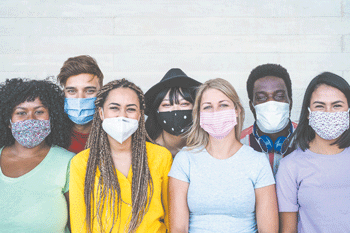 This time last year, we were just beginning to grasp what had already hit us. A man who visited a nursing facility in Washington state apparently brought COVID to North Carolina, but most of us did not know anyone infected with COVID even though other carriers were likely circulating. Wearing a mask had yet to occur to us, although we were beginning to think about what we now call “social distancing.” Those who could began isolating and schools shut their doors. An 80-year-old immunologist in Atlanta became a national guru.
This time last year, we were just beginning to grasp what had already hit us. A man who visited a nursing facility in Washington state apparently brought COVID to North Carolina, but most of us did not know anyone infected with COVID even though other carriers were likely circulating. Wearing a mask had yet to occur to us, although we were beginning to think about what we now call “social distancing.” Those who could began isolating and schools shut their doors. An 80-year-old immunologist in Atlanta became a national guru.
What a difference a year makes! Amid illness and deaths that hit different parts of our nation at different times, we fast tracked the development and distribution of highly effective vaccines, and we figured out what to do to protect ourselves and our loved ones to some degree. We decided to protect our elderly first, even though COVID was spread by younger people more often. We made mistakes, but we have learned.
Among our lessons is that COVID is not the last pandemic we will face. Given that reality, what knowledge should we apply to prepare ourselves for the next one? With more than half a million Americans dead of COVID, public health experts have their individual takes on this, of course, but there is agreement on big issues.
Science trumps politics every time. People died while we mocked masks and partied. We can never allow this again.
Viruses do not know about or respect state lines, so it makes no sense to have individual states do their own thing during a pandemic. Communication, collaboration and common goals and practices will go a long way in stemming a national pandemic as will a significantly beefed up national public health system. COVID is a worldwide issue, and the United States will be more successful now and in the future if we act as a whole.
Racial and ethnic minorities and people in poverty have been disproportionately affected by COVID, both by contracting the virus and by its effects on families and economics. Inequities exist in our country in jobs, education, housing, food access, and health care, and the pandemic shone a glaring spotlight on them. Think the difference between having your groceries delivered to your door and the person making those deliveries. Think those able to work from home and those required to go to a workplace. During what is being dubbed an “inter-pandemic period,” it is time to address these disparities. We really are all in this together.
We human beings are social creatures, and forced isolation has been hard on us, including on children locked out of schools and trying to learn virtually. It has been hard, too, on parents trying to work remotely from home or struggling for child care. As we come out of isolation, we should cut ourselves and others some slack. We have missed human company, and it will take a while to ease back into what we think of as “normal.”
And, finally, as painful as it is to write this, we Americans have some soul searching to do. Millions of us apparently care more about our own individual rights than about the wellbeing of others, loved ones included. When we believe our own “right” not to mask is more important than the health of others with whom we have contact — many of whom are essential workers helping us, something is seriously wrong with our thinking. The pandemic has exposed such selfishness as never before, and it is not a pretty picture or a reflection of portrait we have historically shown the world. And, make no mistake — the world is watching us